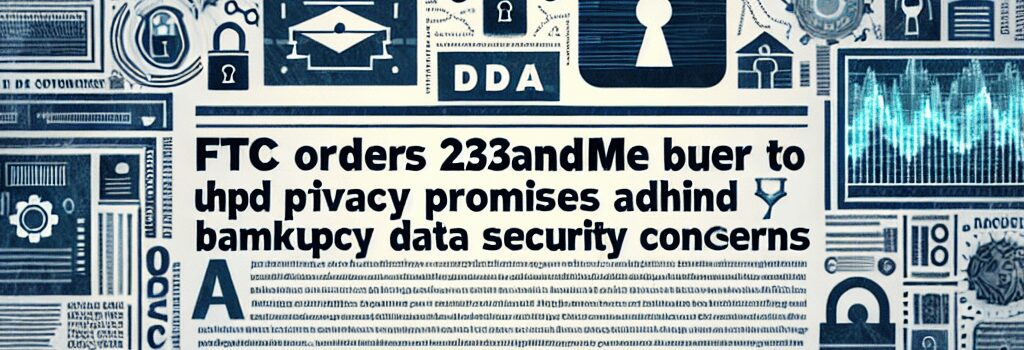FTC Orders 23andMe Buyer to Uphold Privacy Promises Amid Bankruptcy and Data Security Concerns

The Federal Trade Commission has issued a stern warning that any prospective buyer of 23andMe must honor the company’s longstanding privacy commitments to its customers, a directive that comes amid a turbulent bankruptcy proceeding. This decision underscores the importance of protecting sensitive genetic data, while highlighting the technical, legal, and regulatory challenges involved in managing such information.
Genetic Data Privacy in the Digital Age
FTC Chairman Andrew Ferguson has expressed serious concerns about the fate of millions of American consumers’ personal data during the ongoing 23andMe bankruptcy process. In his letter to representatives of the US Trustee Program, a division within the Department of Justice responsible for overseeing bankruptcy proceedings, Ferguson emphasized that the sale or transfer of 23andMe must not compromise the privacy and security of sensitive genetic information, health data, ancestry information, and other personal details.
23andMe’s user base, now totaling approximately 15 million customers, has provided extensive data sets that include not only genetic sequences, but also personal identifiers such as contact and billing information, and even communication exchanged through the platform. The FTC’s directive ensures that, under Section 363(b)(1) of the Bankruptcy Code, any change of ownership must honor every promise made to customers regarding data protection.
Technical Aspects of Securing Genetic Information
From a technical perspective, handling genetic data requires rigorous standards of security and encryption. 23andMe utilizes advanced cryptography to safeguard sensitive information and ensure that all data transmissions are encrypted using protocols like TLS (Transport Layer Security). Furthermore, access control mechanisms and multi-factor authentication are critical in preventing unauthorized access.
Recent incidents have demonstrated vulnerabilities in even the most robust systems; for example, a breach in December 2023 reportedly affected the ancestry data of 6.9 million users. This event has pushed companies within the genetic testing space to adopt more comprehensive cybersecurity strategies, including end-to-end encryption, partitioned data storage, and real-time threat detection systems, all of which are essential to maintain consumer trust.
Legal and Regulatory Landscape
Ferguson’s letter specifically references Section 363(b)(1) of the Bankruptcy Code, which mandates that consumer promises remain intact even in situations involving bankruptcy. The legal framework mandates that any buyer of 23andMe must expressly agree to adhere to existing privacy policies and ensure that any future changes do not compromise user rights.
In addition, 23andMe has long maintained that data sharing is tightly controlled. The company restricts the dissemination of personal data to service providers through contractual agreements, ensuring that third-party entities are bound by rigorous confidentiality clauses. Disclosures to entities such as insurance companies, employers, or law enforcement are strictly governed by legal processes including subpoenas or court orders.
Deep Dive: The Intersection of Data Privacy and Bankruptcy
Bankruptcy proceedings involving companies that manage sensitive data create complex legal and ethical dilemmas. The transfer of genetic information during such proceedings presents unique challenges; genetic data is both immutable and highly personal, meaning any breach or misuse can have long-lasting repercussions for individuals and their families. Experts in both bankruptcy law and data privacy assert that maintaining strict adherence to pre-existing privacy commitments is not only a legal obligation but a moral imperative.
- Immutable Data Concerns: Once genetic data is compromised, the effects can be irreversible, making the protection of this information paramount.
- Consumer Trust: Upholding privacy commitments is essential to maintain and rebuild consumer trust, especially following high-profile security breaches.
- Regulatory Oversight: Regulatory bodies like the FTC are expanding their oversight to ensure that technological companies do not sidestep their promises during financial restructurings.
An Industry Under Scrutiny: Regulatory and Executive Challenges
The 23andMe case is not the first instance of regulatory intervention in the technology sector, yet it stands out due to the sensitivity of the data involved. The situation is further complicated by ongoing political challenges regarding agency independence. Notably, recent executive orders have attempted to limit the autonomy of regulatory bodies such as the FTC. Despite controversies surrounding the dismissal of commissioners and attempts to reframe the agency’s independence in official documentation, the FTC’s commitment to consumer protection in this case remains unwavering.
Industry experts warn that without robust oversight, the transfer or sale of sensitive data during bankruptcy could set a damaging precedent. Academic and legal scholars alike are calling for clearer guidelines that ensure consumer data is safeguarded, even as corporate ownership structures change under distress.
Expert Opinions and Future Directions
Tech industry analysts have highlighted the essential role of compliance in the modern digital economy. Cybersecurity experts argue that integrating advanced security protocols—including blockchain-based audit trails and enhanced encryption algorithms—could revolutionize how genetic and other sensitive data is protected during corporate restructurings. Meanwhile, legal experts anticipate further legislative reforms that could bolster consumer rights in the event of data transfer or emerging digital asset classes.
Looking to the future, there is a growing consensus that companies must invest more heavily in secure data infrastructures and transparent governance models. The interplay between technological advancements and regulatory measures is critical, ensuring that even in times of financial distress, consumer rights remain protected.
Conclusion
The FTC’s directive to ensure that any future buyer of 23andMe adheres to its stringent privacy standards serves as a crucial reminder about the importance of protecting genetic information. As technologies advance and data breaches become increasingly sophisticated, both companies and regulatory bodies must work in tandem to secure sensitive data. The ongoing bankruptcy and its accompanying legal battles could well redefine how personal data is treated in high-stakes environments, potentially setting a new standard for data privacy and security in the tech industry.
Source: Ars Technica